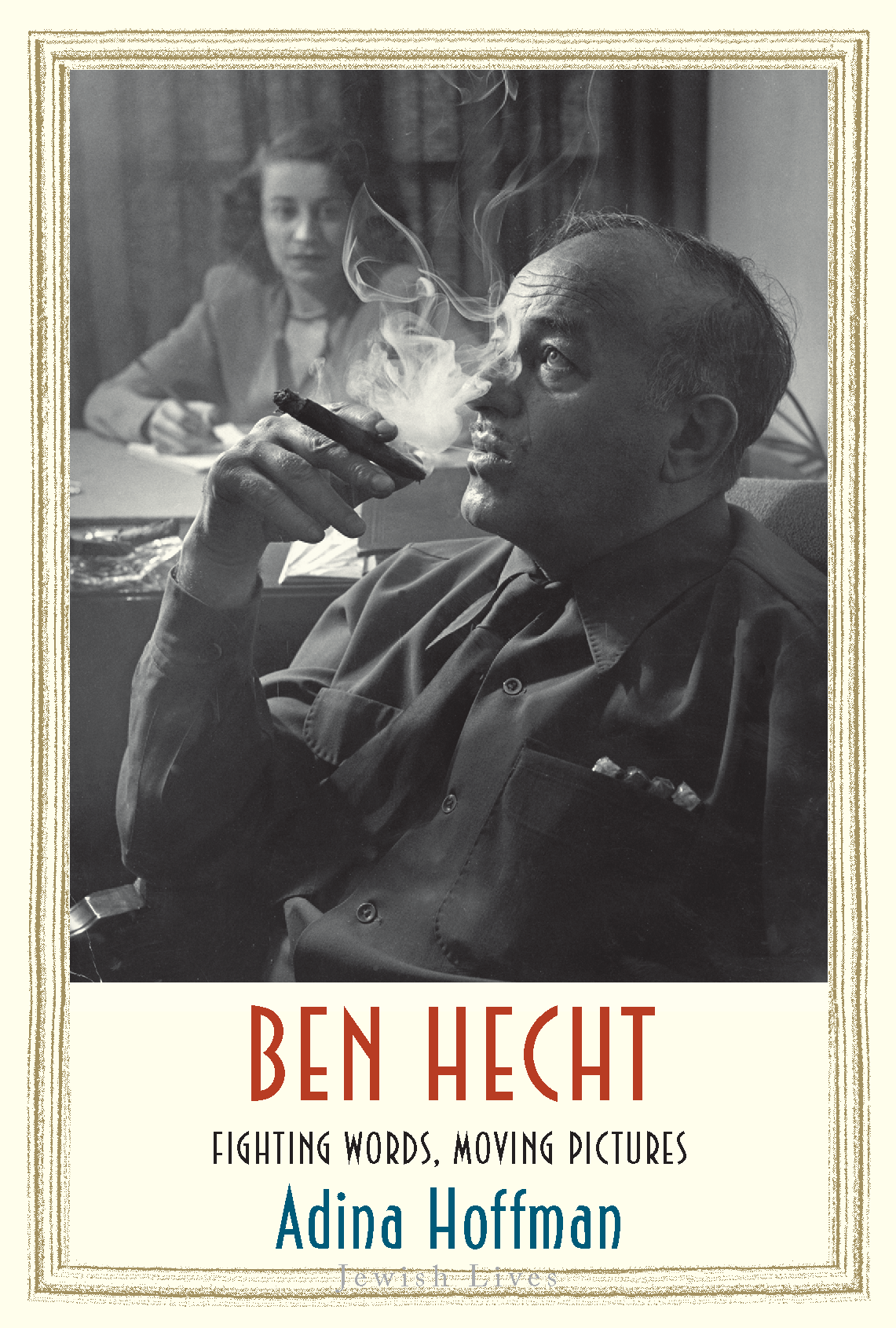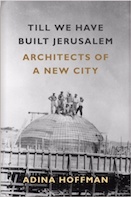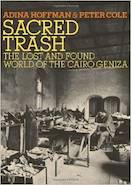

Buy now:
Amazon | IndieBound
Ben Hecht: Fighting Words, Moving Pictures
Yale University Press, February, 2019
audio book, December, 2019
paperback, February, 2020
Named one of the best paperbacks of 2020 by the Sunday Times
PEN/Jacqueline Bograd Weld Award for Biography, finalist
He was, according to Pauline Kael, “the greatest American screenwriter.” Jean-Luc Godard called him “a genius” who “invented 80 percent of what is used in Hollywood movies today.” Besides tossing off dozens of now-classic scripts—including Scarface, Twentieth Century, and Notorious—Ben Hecht was known in his day as ace reporter, celebrated playwright, taboo-busting novelist, and the most quick-witted of provocateurs. During World War II, he also emerged as an outspoken crusader for the imperiled Jews of Europe and later became a fierce propagandist for pre-1948 Palestine’s Jewish terrorist underground, a fact that brought about his own private blacklisting by Hollywood. Whatever the outrage he stirred, this self-declared “child of the century” came to embody much that defined America—especially Jewish America—in his time.
Hecht’s notoriety has dimmed with the decades, but Adina Hoffman’s vivid portrait brings this charismatic and contradictory figure back to life on the page. Hecht was a renaissance man of dazzling sorts, and Hoffman—award-winning biographer, former film critic, and eloquent commentator on Middle Eastern culture and politics—is uniquely suited to capture him in all his modes.
“Adina Hoffman’s superb [book]… loads Hecht’s staggering contradictions into a compact but abounding two hundred twenty pages… She writes with enormous flair.”
–David Denby, The New Yorker
“Hecht’s life was extraordinary, his writing is (mostly) a tonic, his films are (in the main) dazzling, and Hoffman has brilliantly caught his restless, contradictory quality in crystalline prose. Her analysis of his Jewishness is nothing short of a revelation.”
–Simon Callow, The Sunday Times
“Sensitive and incisive … To boil down such a profuse, not to say verbose, career into so compact a volume was a challenge, but [Hoffman] has achieved much more than elegant concision. Alert to the wiles and intricacies of someone who savored his own contradictions, she makes contact with a living personality, creating a portrait both sympathetic and clear-eyed.”
–Geoffrey O’Brien, The New York Review of Books
“Hoffman’s superb [book] accomplishes a great deal in a relatively compact form. It’s terrific on both Hecht’s prodigious output, sometimes credited, sometimes uncredited, [and is] also sharp on Hecht’s lesser-known political and religious impulses.”
–Michael Phillips, The Chicago Tribune
“[A] precise and lively portrait…. Each phase in Hecht’s adventures is electrifying…. Hoffman’s concentrated biography is smartly entertaining and revelatory.”
–Booklist, starred review
“Deeply insightful … Hoffman renders Hecht fully in this slender, elegant biography.”
–The National Book Review
“Splendid…. Hoffman brings objectivity and an amused skepticism to her subject…. [She] juggles Hecht’s contradictions as deftly as he juggled his many commitments. I closed the book thinking that his life would make one hell of a Hecht movie.”
–Carrie Rickey, The Forward
“Brisk, scintillating.”
–The Spectator

Buy now:
Amazon | IndieBound
Till We Have Built Jerusalem: Architects of a New City
Farrar, Straus and Giroux, 2016
A remarkable view of one of the world’s most beloved and troubled cities, Adina Hoffman’s Till We Have Built Jerusalem is a gripping and intimate journey into the very different lives of three architects who helped shape modern Jerusalem.
The book unfolds as an excavation and opens with the arrival in 1930s Jerusalem of the celebrated Berlin architect Erich Mendelsohn, a refugee from Hitler’s Germany, who must reckon with a complex new Middle Eastern reality. Next we meet Austen St. Barbe Harrison, Palestine’s chief government architect from 1922-1937. Steeped in the traditions of Byzantine and Islamic building, this “most private of public servants” finds himself working under the often stifling and violent conditions of British rule. And in the riveting final section, Hoffman herself sets out through the battered streets of today’s Jerusalem searching for traces of a possibly Greek, possibly Arab architect named Spyro Houris. Once a fixture on the local scene, Houris is now utterly forgotten, though his grand, Armenian-tile-clad buildings still stand, a ghostly testimony to the cultural fluidity that has historically characterized Jerusalem at its best.
A beautifully written rumination on memory and forgetting, place and displacement, Till We Have Built Jerusalem uncovers ramifying layers of one great city’s buried history as it asks what it means, everywhere, to be foreign and to belong.
“[A] brave and often beautiful book . . . [Hoffman’s] subjects may be three now largely obscure builders … but Till We Have Built Jerusalem is very much a book about the present . . . [Hoffman] writes with a quiet, stubborn courage.”
–Ben Ehrenreich, The Los Angeles Times
“Lovely . . . A composite of biography, architectural and political history, and reportage, Hoffman’s engaging book illustrates the intricate interplay between architecture, identity, and history in this ancient and troubled city.”
–The Christian Science Monitor
“[A] scintillating study . . . Hoffman profiles three architects working in Palestine under British rule from 1918 to 1948 . . . The result is both vivid architectural criticism and an illuminating meditation on why Jerusalem’s divisions now seem intractable.”
–Publishers Weekly, starred review
“A fascinating synthesis that manages to distill biography, history, politics, aesthetics, religion and psychology into one illuminating, lively, witty text. This is one of the finest books I’ve ever read on the difficult, fragile arts of architecture and city-making.”
–Phillip Lopate
“Adina Hoffman does for Jerusalem what great writers have done for Paris, London, and New York: with charm, skill, and originality, she weaves together a vivid social and architectural history of one of the fabled cities of the world.”
–Vivian Gornick

Buy now:
Amazon | IndieBound
Sacred Trash: The Lost and Found World of the Cairo Geniza, with Peter Cole
Schocken/Nextbook, 2011
Winner of the American Library Association’s Brody Medal for the Jewish Book of the Year
“A small masterpiece. The romance of Hebrew scholarship has never been so vividly conveyed. This book is extraordinary in characterization, thought, and prose style. It will teach common readers, Jewish and Gentile, how much spiritual tradition owes to the greatest scholars. This teaching comes through delight.”
–Harold Bloom
“Sacred Trash is a jewel of a book: a lively and deeply informed account of the Cairo Geniza, a magnificent Egyptian treasure-house of Jewish religion, literature and history that was forgotten for centuries, and of the extraordinary crew of scholars and impresarios who saved the documents, fitted the scraps back together and made them speak and sing.”
–Anthony Grafton
“Adina Hoffman and Peter Cole spin an extraordinary tale of intellectual adventure and lasting scholarly accomplishment. The men and women who brought the Cairo Geniza to light are presented here in painstaking detail, their quirks and their brilliance exposed in equal measure. Carefully researched and beautifully written.”
–James Kugel
“One hundred and twenty years ago, time travel was all at once realized: with the discovery of the Cairo Geniza, medieval Jewish life in all its sacred and mundane efflorescence came tumbling out in thousands of manuscript fragments, each one a distinct and living voice of an ancestral civilization. No longer can we speak of the seven wonders of the world — in this astounding and acutely relevant tale, Adina Hoffman and Peter Cole have uncovered a remarkable eighth; and in its connection to our own humanity, it surpasses all the rest.”
–Cynthia Ozick

Buy now:
Amazon | IndieBound
My Happiness Bears No Relation to Happiness:
A Poet’s Life in the Palestinian Century
Yale University Press, 2009
“Luminous … Hoffman presents readers with a subtle, moving evocation of the human realities of the Palestinian experience, rooted in land and memory.”
–Publishers Weekly, starred review
“[A] superb biography … Hoffman writes with a narrative brio … A remarkable achievement.”
–Pankaj Mishra, New York Review of Books
“Beautifully written … [This] is not only the biography of a remarkable man; it is an act of reclamation against the erosions of memory.”
–Eric Ormsby, The Times Literary Supplement
“I would place My Happiness Bears No Relation to Happiness among the five ‘must read’ books on the Israel-Palestine tragedy.”
–Michael Sells, author of Approaching the Qur’an
“Extraordinary …. Astonishing in its vividness and detail.”
–Ghada Karmi, Journal of Modern Jewish Studies
“A remarkable book … A triumph of personal empathy and historical insight, and a beacon for anyone who knows that ‘more joins than separates us.’”
–Boyd Tonkin, The Independent
One of Booklist’s top ten biographies of 2009
One of Barnes & Noble Review’s best books of 2009
One of the Seminary Co-op Bookstore’s best 20 books of 2009
Winner of the UK’s 2010 Jewish Quarterly-Wingate Prize.

Buy now:
Amazon | IndieBound
House of Windows:
Portraits from a Jerusalem Neighborhood
Steerforth Press, 2000
Broadway Books (paperback), 2002
“The writing is as poignant and layered as the subjects she writes about–and by detailing the ways history and culture play out in the day-to-day lives of the residents of one of the world’s most contentious cities, she adds nuance and complexity to a much-studied subject.”
–Publishers Weekly
“This remarkable work of non-fiction, wonderfully written, takes us deep inside the lives … of the people who are virtually invisible outside of Israel.”
–The Independent